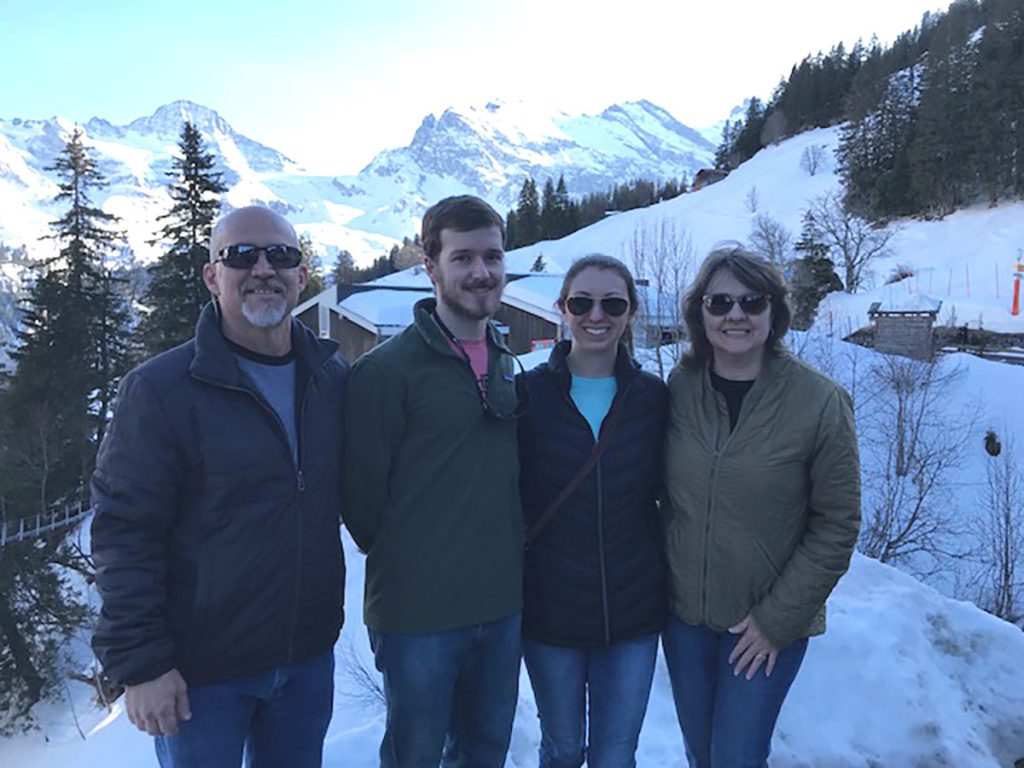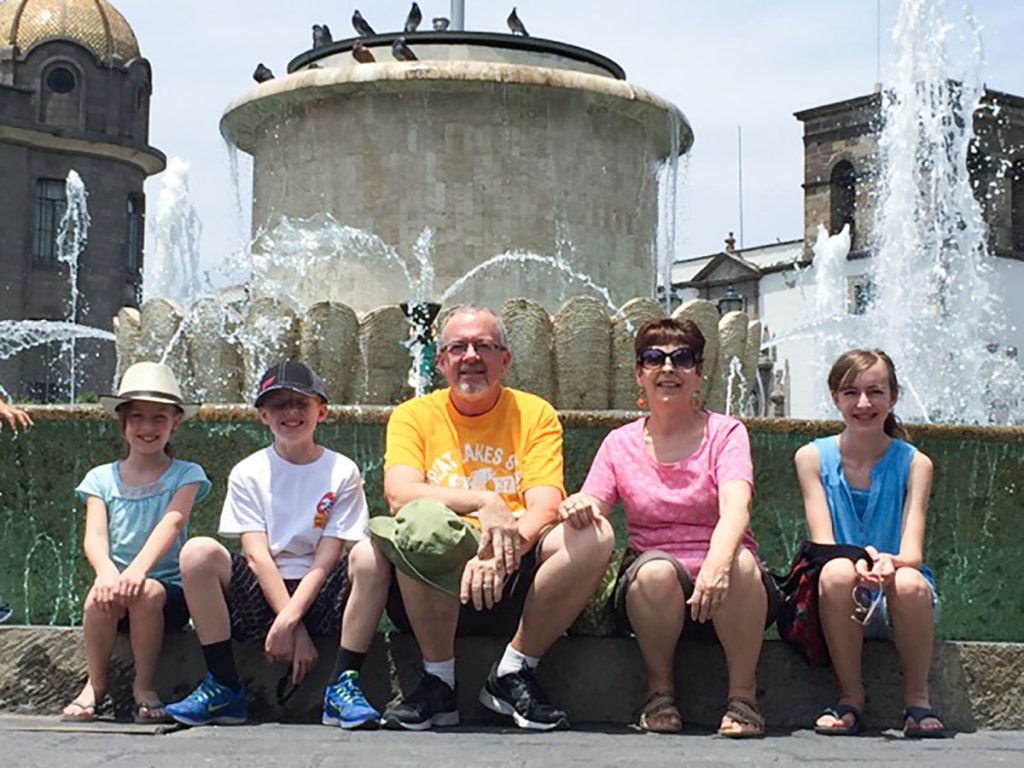
Becoming a Missionary, Missionary Life
When Missionaries Leave Adult Children Behind
May 10, 2019
by admin

If Jocelyn Potter and her boyfriend didn’t get engaged and married in the next four months, they would have to wait years to try again. That is, if they wanted Jocelyn’s parents to be there and not just watching the video in the Zimbabwean bush.
Jocelyn’s mom and stepdad, Cheryl and Dave Jereb, were TEAM missionaries on home assignment. They had about four months to visit friends and family and then return to Zimbabwe.
So, Jocelyn and her boyfriend got engaged and planned the wedding in three months.
“We scheduled the wedding for a Friday, and their plane ticket … was for Monday,” Jocelyn says. “We literally pushed it as far as humanly possible.”
It was a huge victory — but just one of many challenges Jocelyn’s family would face. In the years since, they’ve dealt with separation during pregnancy, life-threatening illnesses and the raising of grandkids.
And they’re not alone. More and more retirees and late-in-career Christians are leaving their adult kids for the mission field. And it’s forcing families to ask the question, “What do you do when parents become missionaries after the kids are grown?”
Start the Missionary Journey Together
In 2014, Anna Price moved from Kentucky to Texas so she could be near her parents. So, it came as a surprise when God called her parents to ministry in Croatia just three years later.
Not only that, but their assignment started in three months.
“It was one of those things that at first was like, ‘No way, that’s crazy,’” Anna says.
Anna’s faith helped her understand — and even celebrate — her parents’ new roles overseas. But other family members struggled.
“I know it could feel like they’re playing a God card to go on a new adventure,” Anna says. So, she advises missionaries to take care in explaining what they’re going to do and why they feel the work is important.

Before Ken and Marilyn Coover left for the mission field, they wanted to be sure their son, Nick, and his wife (center) felt peace about it. Photo courtesy of Marilyn Coover.
Other adult missionary kids expressed how important it was to feel that their opinions mattered to their parents.
When Aaron Vander Mey’s parents started considering missions in Mexico, they asked their kids to pray with them about the decision.
“I thought it was good that they included us in that,” Aaron says. “You know, wanting to hear from their adult children what they thought God was saying. So kind of allowing God to speak to us, too.”
And when Nick Coover’s parents left for Germany, they asked for Nick’s blessing, the same way an adult child might ask for their parents’. Before leaving adult children for the mission field, make sure they feel heard and understand why you’re going.
Remember, You’re All Siblings in Christ
In many ways, missions as a second career turns the parent-child relationship on its head. For the first time, children have to release their parents to God, trusting Him to take care of them in the great, big world.
When Jocelyn’s mom told her about teenage boys who threw rocks at her, Jocelyn’s gut instinct was to get on a plane and “beat some boys.” And at one point, Aaron anxiously watched news stories about American adults being kidnapped in Mexico.
“I was actually really worried. …. If something like that happened, what in the world would I do?” Aaron says.
But both Aaron and Jocelyn remind themselves that their parents’ risks are worth the eternal rewards. They remember that their parents are, ultimately, fellow believers who have to follow God regardless of the cost.
“I had to face it [that] if something ever happened to my mom, you know what, that’s really cool that God sees her as someone … who even has lived a life worthy to be called a martyr,” Jocelyn says.
Get Creative to Stay in Touch
In the day to day, modern technology makes it a little easier to release your parents or leave your adult children behind. But the big thing is finding what works for your family.
Aaron’s family uses a Bible study app, where all three generations can go through a Bible study together and leave comments on what impacted them. Anna and her mom started watching the same TV show so they would have something fun to share.
Other families use voice messaging apps like Marco Polo or share photos of the grandkids through apps like FamilyAlbum. To their surprise, Jocelyn’s parents found that Facebook Messenger had the best video chatting options for the bush of Zimbabwe.
“Finding common grounds in technology and what will work for your family is key,” Nick says.
Visit the Mission Field

Christy De Man’s children still talk about the time they saw their grandparents’ ministry in Mexico. Photo courtesy of Christy De Man.
Long distance communication also becomes easier if adult children can visit parents on the mission field at least once. Even a week can make a lasting difference.
After her parents had been on the mission field for three years, Christy De Man (sister to Aaron Vander Mey) took her family to visit them in Mexico.
For the first time, she could put faces to names, and her kids could see what a home church looked like. But Christy also found comfort in simple things, like being able to envision the park across the street from her parents’ house or the local smoothie shop.
“It was such a good memory for my family, and we hold onto that time being there,” Christy says. “We talk about it all the time.”
If you can’t visit, Anna suggests still learning as much as you can about the people your parents are serving, “so that it’s not just about them leaving you, but you’re able to support them in going to someone else.”
Ask the Church for Support
Of course, some elements of the parent-child relationship just can’t be filled long distance. That’s where the Church can play a critical support role for missionary families with adult children.
Before Nick’s parents, Marilyn and Ken, left, they made a list of people Nick and his wife can go to if they have a problem. They noted what each person’s unique skills are, so if, for example, the washer breaks, Nick knows exactly who can fix it.
“We had so many people who support us who said, ‘Anything those kids need, you tell them to call,’” Marilyn says.
In addition to everyday life, many adult MKs take on additional responsibilities when their parents leave — from sorting parents’ mail, to editing their prayer letters, to acting as their power of attorney. Just asking about these extra burdens can be a relief to adult missionary kids who feel like no one understands what they’re facing.
Churches can also encourage adult MKs by inviting them over for holidays or engaging in their children’s lives the way grandparents would if they were there. The big thing, Jocelyn says, is not leaving it up to chance.
“If you do a broad thing of, ‘Hey don’t forget to reach out to them,’ everyone will think that someone else is doing it, and it will never get done,” Jocelyn says.
Instead, she encourages church leaders to ask specific individuals to take action so they know they are needed.
Embrace the Challenge — and the Blessing
Ultimately, many adult MKs say sending their parents to the mission field has not only been exciting to watch but has grown their own faith as well.
“God is using them, and they need to be there. … And it’s always a challenge to me — like, always,” Christy says. “Like, how can I be better here? How can I do that kind of stuff here?”
And as adult MKs consider how they can live out their faith better, their parents serve as a reminder that it’s never too late to start something new.
“[It] has been a huge blessing because it’s just ingrained that more in me of just, God’s plans are endless,” Jocelyn says, “and they don’t have a time limit or age where it goes away.”
God calls us all to preach the Gospel — and it’s never too late to obey! Talk with a missions coach to see how God can use you. Your coach will help you explore opportunities that fit your passions, skills and life stage. What do you have to lose?


